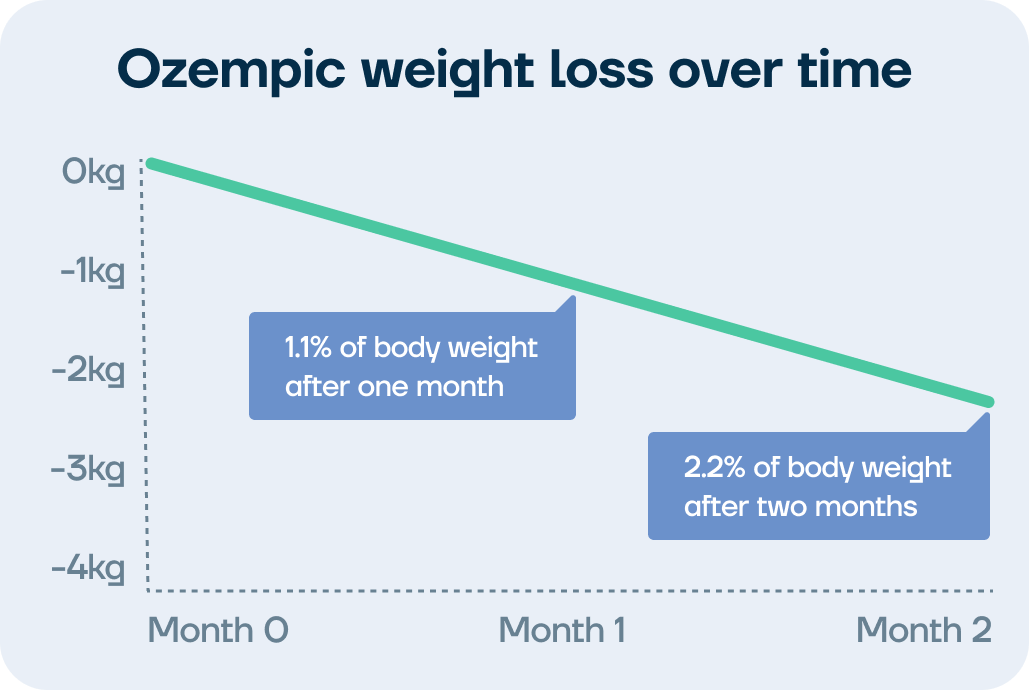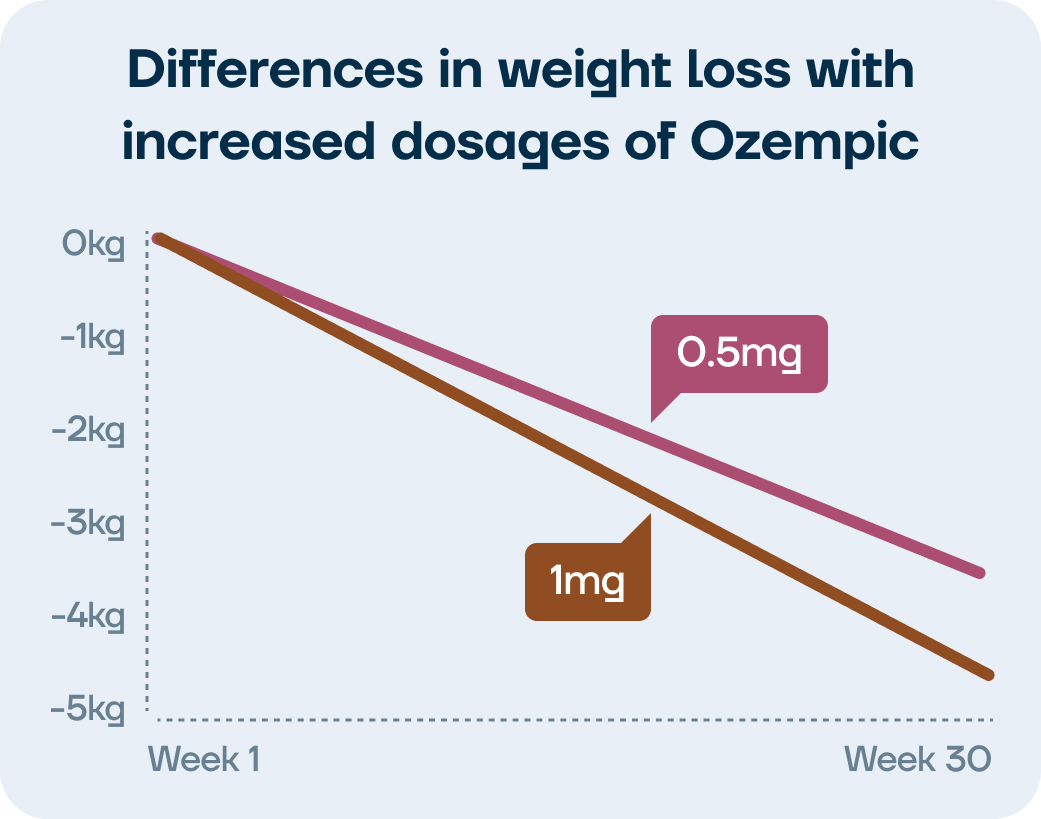Jump to: What to expect in your first month | How to maximise weight loss | Managing side effects | Frequently asked questions | Take home message
Most people lose around 1kg or 1.1% of their body weight in their first month on Ozempic, according to data from randomised controlled trials1.
After two months, this increases to around 2kg or 2.2% of body weight. Individual responses vary considerably – some people experience faster initial results while others see a more gradual start.

Important safety information: Ozempic (semaglutide) is a prescription-only medication for treating type 2 diabetes. This article is for informational purposes only. Always consult with your healthcare provider before starting any new medication, particularly if you have pre-existing health conditions.
What to expect in your first month on Ozempic
During your first month on Ozempic, you’ll likely experience several changes as your body adjusts to the medication:
Week 1-2:
- Initial impact on appetite usually begins within 24-48 hours of your first injection
- You may notice reduced hunger and fewer food cravings
- You’ll likely feel fuller more quickly
- Side effects like nausea or fatigue may appear
- Effects might wear off after 5 days before your next injection
Week 3-4:
- Weight loss typically becomes noticeable (1-2% of starting weight)
- Hunger levels become more consistent
- Side effects generally start to decrease
- Energy levels often improve
- Drug should reach a ‘steady state’ where its levels in the blood remain consistent
| Week |
Average weight loss |
Common experiences |
| Week 1 |
0.25-0.5% |
Initial appetite reduction, possible mild side effects |
| Week 2 |
0.5-1% |
Continued lower appetite, some fluid loss |
| Week 3 |
0.75-1.5% |
More consistent effects, adjusting to new eating patterns |
| Week 4 |
1-2% |
Hunger levels stabilise, side effects decrease |
First month dosing and medication effects
Ozempic uses a gradual dosing approach to minimise side effects:
- You’ll start with 0.25 mg weekly for 4 weeks
- This starting dose helps your body adjust, but isn’t going to have the desired effects on blood sugar or weight loss for most people
- Most weight loss and blood sugar improvements occur at the 0.5 mg and 1 mg maintenance doses
- The medication takes 4-5 weeks to reach ‘steady state’ in your body where its levels remain consistent in the blood
How to maximise weight loss on Ozempic
While Ozempic effectively reduces appetite, research shows you can enhance your results by implementing certain strategies:
Focus on protein at every meal
- Include a portion of protein the size of your palm (20-40g per meal)
- Protein helps preserve muscle mass during weight loss
- Examples: 250g Greek yoghurt (~20g protein), 4 eggs (24g protein), 100g chicken breast (30g protein)
Create a supportive food environment
- Remove ultra-processed foods from your home
- Prepare healthy meals in advance for busy days
- Keep pre-cut vegetables readily available
- Plan your meals around protein sources
Increase movement gradually
- Add a morning walk to your routine – even 5 minutes helps
- Consider resistance training 2-3 times weekly if able
- Focus on movement you enjoy rather than intense exercise
- Try ‘exercise snacking’ – short bursts of activity throughout the day
Long-term expectations for Ozempic weight loss
Understanding the longer-term trajectory helps put your first month in context:
| Timeframe |
Average weight loss |
Research source |
| 1 month |
1-2% |
SUSTAIN 1 trial1 |
| 3 months |
3-5% |
SUSTAIN trials2 |
| 6 months |
5-7% |
Clinical data2 |
| 12 months |
6-8% |
Long-term studies2 |
Do you lose more weight on the higher doses of Ozempic?
Research shows that higher doses of Ozempic do lead to more weight loss. One study found that after 30 weeks1:
- 0.5 mg dose: Average weight loss of 3.7kg
- 1 mg dose: Average weight loss of 4.5kg

However, individual responses vary significantly. Some people achieve excellent results on lower doses because they’re more sensitive to the drug’s effects and develop healthy habits alongside the medication.
Managing side effects during your first month
Side effects are common during the first month as your body adjusts to Ozempic. Knowing how to manage them helps you stay comfortable:
For nausea and digestive discomfort:
- Eat smaller, more frequent meals
- Avoid greasy, spicy, or highly processed foods
- Stay well hydrated (aim for 2-3 litres daily)
- Try ginger tea or peppermint tea
- Avoid lying down immediately after eating
For fatigue:
- Ensure adequate protein intake at every meal
- Prioritise 7-8 hours of sleep
- Stay hydrated throughout the day
- Consider light exercise to boost energy
For injection site reactions:
- Rotate injection sites each week
- Allow medication to reach room temperature before injecting
- Apply ice before injection if needed
In clinical trials, approximately 20-30% of participants experienced mild side effects during the first month, with most improving significantly by week 41.
Comparison with other weight-loss medications
| Feature |
Ozempic |
Wegovy |
Mounjaro |
| Drug |
Semaglutide |
Semaglutide |
Tirzepatide |
| First month weight loss |
1-2% |
1.5-3% |
2-4% |
| Maximum dose |
1 mg |
2.4 mg |
15 mg |
| UK weight loss approval |
✗ |
✓ |
✓ |
| Long-term average loss |
6kg at 40 weeks2 |
15% at 68 weeks3 |
26% at 72 weeks4 |
Ozempic is no longer available as a weight-loss injection in the UK
Under new government regulations, healthcare providers can no longer prescribe Ozempic to patients for weight loss. It’s only approved for people living with type 2 diabetes.
However, both Wegovy and Mounjaro are available in the UK for weight loss, and research suggests that both medications lead to more substantial weight loss than Ozempic.
Frequently asked questions
Why am I not losing weight after a week on Ozempic?
Weight loss isn’t always immediate or linear. The starting dose (0.25 mg) is primarily for adjustment, not weight loss. Most people begin seeing consistent results by weeks 2-3. Factors like water retention and hormonal fluctuations can also mask early weight loss.
Will I lose more weight if I eat less on Ozempic?
Not necessarily. While Ozempic reduces appetite, eating too few calories can slow metabolism and lead to muscle loss. Focus on nutritious, protein-rich foods rather than severe restriction. Most patients naturally eat 20-30% fewer calories without counting.
Does weight loss on Ozempic slow down after the first month?
Actually, weight loss often accelerates after the first month as you move to higher, more effective doses and the medication reaches steady state in your system. The most significant weight loss typically occurs between months 2-6.
How quickly will I start losing weight on Ozempic?
Most people begin to see some weight loss within the first 2 weeks, typically around 0.5-1kg. However, more noticeable results usually appear after 3-4 weeks once your body has adjusted to the medication.
Can I still get Ozempic for weight loss in the UK?
No, Ozempic is now only prescribed for type 2 diabetes in the UK. If you’re looking for weight-loss medication, Wegovy (same drug but higher doses) and Mounjaro are the approved options.
What happens if I miss a dose in my first month?
If you miss a dose and it’s been less than 5 days, take it as soon as you remember. If more than 5 days have passed, skip the missed dose and take your next dose on the regular day. Missing one dose shouldn’t significantly impact your progress.
How does the first month on Ozempic compare to Wegovy?
Wegovy contains the same active ingredient (semaglutide) but at higher doses. First-month weight loss on Wegovy is typically 1.5-3% compared to Ozempic’s 1-2%. The higher doses of Wegovy generally produce faster initial results.
Will I regain weight if I stop after one month?
Stopping any weight-loss medication after just one month typically results in weight regain, as sustainable habits haven’t had time to develop.
Research shows that patients who develop healthy habits alongside medication maintain more weight loss long-term.
Take home message
Most people lose 1-2% of their body weight (roughly 1-2kg for someone weighing 100kg) during their first month on Ozempic, with results varying based on individual factors and response to the medication.
While this initial weight loss is encouraging, the most significant benefits typically appear after 3-6 months on maintenance doses.
Remember that Ozempic is no longer available for weight loss in the UK. Wegovy and Mounjaro are the approved alternatives.
Weight-loss medications work best when combined with healthy lifestyle habits. Ozempic creates an opportunity where reduced hunger makes it easier to establish sustainable eating patterns.
By focusing on protein-rich foods, creating a supportive environment, and gradually increasing movement, you can maximise your results.
The ultimate goal isn’t just short-term weight loss but developing habits that support long-term health and wellbeing.
Second Nature's Mounjaro and Wegovy programmes
Second Nature provides Mounjaro or Wegovy as part of our Mounjaro and Wegovy weight-loss programmes.
Why choose Second Nature over other medication providers, assuming you're eligible?
Because peace of mind matters.
We've had the privilege of working with the NHS for over eight years, helping people across the UK take meaningful steps toward a healthier, happier life.
Our programmes are designed to meet people where they are, whether that means support with weight loss through compassionate one-to-one health coaching, or access to the latest weight-loss medications (like Mounjaro and Wegovy) delivered alongside expert care from a multidisciplinary team of doctors, psychologists, dietitians, and personal trainers.
At the heart of everything we do is a simple belief: real, lasting change comes from building better habits, not relying on quick fixes. We're here to support that change every step of the way.
With over a decade of experience, thousands of lives changed, and a long-standing record of delivering programmes used by the NHS, we believe we're the UK's most trusted weight-loss programme.
We hope to offer you something invaluable: peace of mind, and the support you need to take that first step.
References
- Sorli C, Harashima SI, Tsoukas GM, et al. (2017). Efficacy and safety of once-weekly semaglutide monotherapy versus placebo in patients with type 2 diabetes (SUSTAIN 1): a double-blind, randomised, placebo-controlled, parallel-group, multinational, multicentre phase 3a trial. Lancet Diabetes Endocrinol
- Aroda VR, Ahmann A, Cariou B, et al. (2019). Comparative efficacy, safety, and cardiovascular outcomes with once-weekly subcutaneous semaglutide in the treatment of type 2 diabetes: Insights from the SUSTAIN 1-7 trials. Diabetes Metab
- Wilding JPH, Batterham RL, Calanna S, et al. (2021). Once-weekly semaglutide in adults with overweight or obesity. N Engl J Med
- Jastreboff AM, Aronne LJ, Ahmad NN, et al. (2022). Tirzepatide once weekly for the treatment of obesity. N Engl J Med
- National Institute for Health and Care Excellence. (2023). Semaglutide for managing overweight and obesity. NICE guidance






